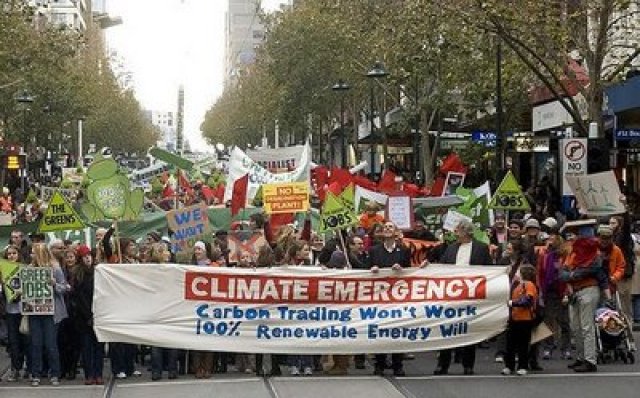
US activist Ben Silverman recently wrote a short essay titled ">“What next for the US climate movement?”
He wrote: “We need to be engaging and incorporating into this struggle millions and millions of people, people who haven’t normally been involved with environmental politics before but who have just as much to lose from climate catastrophe as the most committed of eco-activists. This means having mass outreach and educational campaigns that aim to reach out and work with all sorts of people.”
I think there are some key ingredients or principles for building successful movements.
Diversity of actions
To be successful, we need a combination of mass action, civil disobedience and community education. No tactic should be left off the table without consideration.
If you think about the great social movements in our history, they all involved diverse tactics.
Mass action is a key one. Smaller acts of civil disobedience hold so much more weight when they are backed up by mass rallies on the streets, showing that popular opinion is behind them.
So how do you get large numbers of people to engage in civil disobedience and mass action?
There are no short cuts. It involves patient, persistent, community-based campaign work that aims to reach out to large numbers of people.
Actions such as letterboxing and doorknocking, holding information stalls, organising large rallies and forums, and giving presentations to a wide range of school and community groups.
Social media, including things like Facebook, Twitter, websites, YouTube and online petitions also have a big role to play in getting people involved and sharing information in new ways.
Common demands
We need to move beyond slogans such as “climate action now” as it is too easy for big political parties to agree to them and yet do nothing.
Instead we need to develop clear specific demands — based on the science and focused on the key things we want to achieve — around which we can unite a large number of groups and people.
In Australia, the climate movement has experienced confusion, division and demobilisation in response to the introduction of the carbon pricing scheme.
We need to find a few common demands that can unite the movement again, that will lead to tangible emissions reductions and that can be clearly understood by the public.
A few possibilities could be: end fossil fuel subsidies, stop the coal export expansion and increase the Renewable Energy Target.
Democratic organising methods
Our best chance of getting people to commit their time and energy to the movement is to allow them a voice in the decision making of the group, no matter how big the group is.
Being inclusive and democratic also guarantees that the group will be able to consider wider range of ideas on tactics, demands and priorities.
Of course, everyone can’t get their own way all the time, nor can we spend all our time debating, so we need democratic decision making that can move the group forward while respecting everyone’s input.
Build alliances
Indigenous peoples in many areas, including in Northern America, Latin America, South-east Asia and in Australia, are leading some of the battles against climate damaging projects. What can we do to unite with local Aboriginal communities on common goals?
How can we unite with unions in pushing for a just transition for workers out of destructive industries and into the climate jobs we need?
Some unions have adopted good climate policies and are involved in some good initiatives, like with the Solar Thermal for Port Augusta campaign and the Earthworker solar hot water cooperative, but many are still caught up in defending jobs in fossil fuel projects, no matter what the ecological impact.
But unions can be key instruments of grassroots power. Workers, acting together in unions, can stop projects in their tracks.
Unions have money and influence and can mobilise large numbers of people when they want to. But we are not going to win over workers to the climate movement by threatening to take their jobs away and destroy the livelihoods of their communities.
We need to look for initiatives to jointly campaign for climate action and clean jobs.
Perseverance
Just as the huge marches against the Iraq war didn’t stop our government from
sending in Australian troops, we can’t expect a couple of impressive demonstrations will be enough to win.
We need perseverance and determination and, where possible, we need to keep escalating our actions until we get the changes that we need.
[This is an abridged version of a speech given at the “Working for a safe climate future” conference organised by Climate Action Hobart on June 22.]